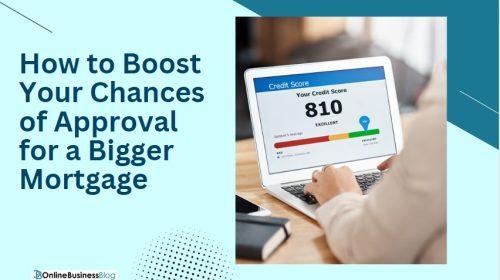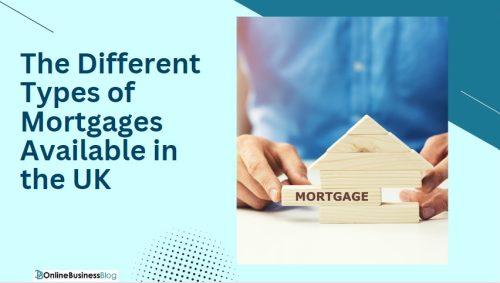Post Contents
Getting a mortgage can be a long and arduous process for many, especially in the UK where prices are high and wages are low. Whether you’re looking to buy your first home or upgrade to a larger one, this article will show you how can I get a bigger mortgage in the UK. We look at everything from budgeting and saving to tips on getting better interest rates and more. Read on to learn more about how you can secure a larger mortgage in the UK.
How can I get a Bigger Mortgage in the UK?
If you’re looking to take out a mortgage in the UK, there are a few things you can do to increase your chances of getting a bigger loan.
First, make sure you have a good credit score. The better your credit score, the more likely you are to be approved for a larger loan. You can check your credit score for free with a service like Experian.
Second, try to put down as large of a deposit as possible. The bigger your deposit, the less risk you pose to lenders and the more likely they are to give you a larger loan.
Third, shop around at different lenders to see who’s willing to give you the best deal. Don’t just go with the first lender you find – compare rates and terms from multiple local or business banks before making a decision.
By following these tips, you should be able to get a larger mortgage loan when applying in the UK.
There are many different types of mortgages available in the UK, and it can be confusing trying to work out which one is right for you. However, with a little research, you should be able to find the perfect mortgage to suit your needs.
Here are some of the most common types of mortgages available in the UK:
- Fixed Rate Mortgages: A fixed-rate mortgage means that the interest rate on your loan will remain the same for a set period of time, usually between 2 and 5 years. This can give you peace of mind knowing that your repayments will stay the same even if interest rates rise. However, it is worth noting that you may pay a higher rate of interest than if you took out a variable-rate mortgage.
- Variable Rate Mortgages: Unlike fixed-rate mortgages, the interest rate on variable-rate mortgages can go up or down over time. This means that your monthly repayments could change, which could either be an advantage or disadvantage depending on how interest rates move. Variable-rate mortgages tend to start off with a lower interest rate than fixed-rate mortgages, so they can be a good option if you think interest rates will fall in the future. However, as mentioned above, you need to be prepared for your monthly repayments to increase if interest rates go up.
- Tracker Mortgages: Tracker mortgages follow the Bank of England base rate (or another specified index) plus a margin set by the lender. This means that as the base rate changes, so too do your interest rate and monthly repayments. Again, this could be an advantage or disadvantage depending on how interest rates move over time.
- Offset Mortgages: Offset mortgages allow you to link your mortgage account to one or more bank accounts, such as savings or current accounts. The amount in these linked accounts is then ‘offset’ against your mortgage balance, meaning that you pay less interest on your loan. For example, if you have a £150,000 mortgage and £20,000 in a linked account, you would only pay interest on £130,000 of that loan instead of the full amount.
- Discounted Rate Mortgages: Discounted rate mortgages are similar to fixed-rate mortgages in that they offer a discounted rate for a set period of time (usually 1 – 5 years). The difference is that with a discounted-rate mortgage, your monthly repayments will go up (or down) when the discount period ends due to changes in the lender’s standard variable rate (SVR).
- Capped Rate Mortgages: Capped rate mortgages also offer a discounted interest rate for a set period of time – usually.
How to Shop Around for the Best Mortgage Rate?
When shopping for a mortgage, it is important to compare rates from multiple lenders. To get the best rate possible, you should:
- Check your credit score and report. Your credit score will impact the interest rate you are offered.
- Shop around at different lenders. Each lender will offer different rates depending on their own internal criteria.
- Get quotes from each lender and compare. Make sure to compare apples to apples – that is, compare the total cost of the loan including interest, fees, and other factors.
- Negotiate with lenders. Once you have found the best rate possible, try to negotiate with the lender for an even better rate.
Tips for Negotiating a Higher Mortgage Loan Amount
If you’re looking to negotiate a higher mortgage loan amount, there are a few things you can do to increase your chances of success.

Some tips to help you get started are:
- Know Your Mortgage Loan Amount Goals
The first step is to know how much you want to borrow money. This will give you a clear target to aim for when negotiating with lenders. It’s important to be realistic here – if you try to borrow too much, you’re unlikely to be successful. - Do Your Research
It’s also important to do your research and understand the market before beginning negotiations. This will help you know what kind of deals are possible and what lenders are likely to be willing to offer. - Be Prepared to Negotiate
Once you’ve done your research and know what you want, it’s time to start negotiating with lenders. Be prepared to haggle and don’t accept the first offer that comes your way. If you’re willing to negotiate it’s possible to get a better deal. - Use a Mortgage Broker
If you’re not confident about negotiating yourself, using a mortgage broker can be a good idea. They’ll be able to help you find the best deals and guide you through the process.
How to Boost Your Chances of Approval for a Bigger Mortgage?
It can be difficult to get approved for a bigger mortgage, but there are some things you can do to improve your chances.
- First, make sure you have a good credit score. A high credit score can increase the chances of getting approved for a mortgage.
- Second, try to put down as much money as possible for a down payment. The larger the down payment, the more likely you are to get approved for a bigger mortgage.

- Third, try to find a cosigner who has good credit and is willing to cosign for you. This can show lenders that you’re serious about repaying your loan and improve your chances of getting approved.
- Lastly, be prepared to answer any questions the lender may have about your finances and why you need a bigger mortgage. If you can show them that you’re responsible and have a plan for repayment, they may be more likely to approve your loan.
Conclusion
In conclusion, getting a bigger mortgage in the UK can be done by meeting certain criteria and following some steps. It is important to understand the factors that lenders consider when assessing your application so you can make sure you are doing everything possible to increase your chances of being approved for a larger loan amount.
Additionally, it helps to shop around and compare different lenders’ rates, terms, fees, and features before making a decision on which lender to go with. With careful preparation and good credit habits, you should have no problem obtaining the mortgage size you need.
FAQS on How can I get a Bigger Mortgage in the UK
1. Is there any way to get a bigger mortgage?
To get a bigger mortgage, you may need to increase your money deposit, demonstrate a higher income, or have a good credit score. Lenders may also consider factors such as your employment history, debt-to-income ratio, and the value of the property you are purchasing.
2. Can I get a mortgage 7 times my salary?
It is not typical for a lender to offer a mortgage that is 7 times your salary. Most lenders have a maximum loan-to-income (LTI) ratio that they use to determine how much they are willing to lend to a borrower. This ratio is based on a number of factors, including your income and your ability to repay the loan.
3. How many times my salary can I borrow for a mortgage?
The amount you can borrow for a mortgage as a multiple of your salary will vary depending on the lender and your individual circumstances. On average, lenders in the UK may offer 4-5 times your salary, but this can be higher or lower based on factors such as your deposit, credit score, and other debts.
4. Can I get a mortgage 5 times my salary?
It is possible to get a mortgage 5 times your salary, but this will depend on the lender’s policies and your individual circumstances. Lenders will consider factors such as your income, credit score, and debt-to-income ratio when determining how much they are willing to lend.



